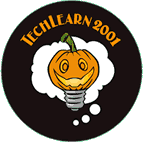| |
PROS |
CONS |
| Production Costs |
By properly breaking content into
learning objects, different parts can be maintained and updated
separately. If a suitable learning object can be found, a new
one does not need to be created. These are costs savers. |
Changing to a learning object approach
from a "self-contained system" approach involves retooling
and retraining costs. |
| Flexibility |
As more and more standards-based learning objects
become available, increased choice will translate into more
flexibility for designers. |
Using standards-based learning objects restricts
the scope of learner information that is accessible by content
if total interoperability is maintained*. |
| Pedagogy |
Learning objects fit nicely into many
ISD theories. Instructional templates can be created with slots
for specific types of learning objects. Learning objects may
encourage designers to operate in more disciplined ways with
a positive effect. |
Restrictions on learner information
available could restrict pedagogical approaches. Approaches
using lengthy discursive material may not benefit from the use
of learning objects. |
| End User Cost |
The learning object approach prevents consumers
from being locked in to specific systems. As standards take
hold, the market for content will take on more of the properties
of a typical consumer market with lower costs and increased
choice. |
The cost of converting existing content to a learning
object approach may be significant |
| Industry Support |
All leading system vendors and content
producers are supporting SCORM and other standards that are
based on or that complement a learning object approach. |
Realistically, it is twelve to eighteen
months between the time the vendor community adopts an approach
and the time products that implement the approach are available. |
